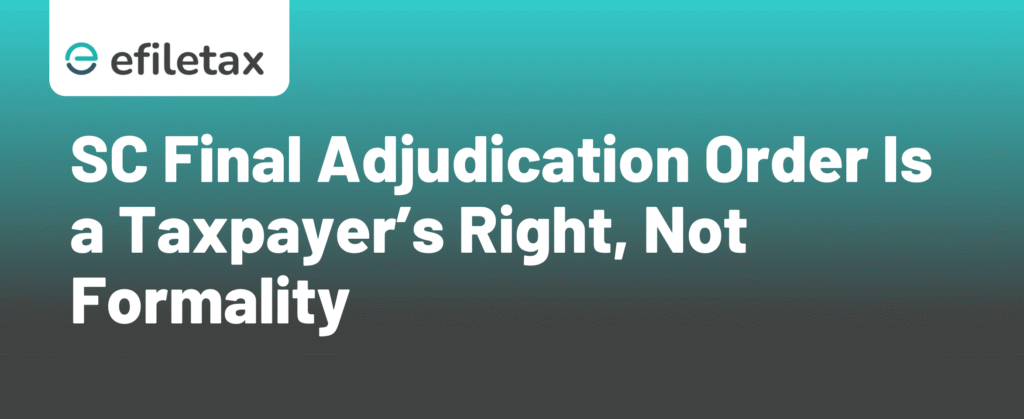
Supreme Court on Final Adjudication Orders A Substantive Safeguard
The final adjudication order is not a procedural formality—it is a constitutional safeguard. This was the key takeaway from a recent Supreme Court ruling that emphasized the role of adjudication in protecting the taxpayer’s rights under the principles of natural justice.
Let’s break down what this means for Indian taxpayers, especially those dealing with recovery, penalty, or reassessment notices.
Why Final Adjudication Order Matters
The SC observed that once a taxpayer is issued a show cause notice, a final adjudication order must be passed, taking into account the reply and representations made. Skipping this step or treating it as a formality violates Article 14 (equality before law) and undermines the right to a fair hearing.
Legal basis for the ruling:
- Article 14 of the Constitution – guarantees fairness and non-arbitrariness in actions of the state.
- Principle of natural justice – “Audi alteram partem” i.e. hear the other side.
- Section 75(4), CGST Act, 2017 – mandates personal hearing before passing any adverse order.
Final Adjudication Order: Key Features
| Particulars | Explanation |
|---|---|
| What it is | A reasoned speaking order passed after SCN reply and hearing |
| Why it’s important | Safeguards taxpayer’s right to be heard |
| When it’s required | In all cases where recovery, penalty, or tax demand is proposed |
| Who must pass it | The adjudicating authority (GST officer, AO, Customs officer, etc.) |
| Legal consequences if missed | Entire proceedings may be quashed by HC/SC for violation of natural justice |
Practical Impact on GST & Customs Cases
Without a final adjudication order (i.e., DRC-07 with detailed reasoning), recovery cannot proceed.
This SC judgment strengthens the following:
- Taxpayers can challenge recovery without adjudication order
- Any attachment or coercive action before order is illegal
Expert View: Don’t Ignore the SCN Stage
- Reply in detail with facts, law, and case laws
- Demand a personal hearing under Sec 75(4), CGST Act
- Insist on a reasoned final order—else challenge it in writ
“A well-drafted reply is your first and strongest shield.
Related Notification & Case References
- Section 75(4), CGST Act, 2017
- Union of India vs. Bharti Airtel Ltd. [2021] 129 taxmann.com 86 (SC)
- Khemka & Co. (Agencies) Pvt. Ltd. vs. State of Maharashtra [1975] 2 SCC 22 – Natural justice is a constitutional requirement.
- Latest SC Case: Interglobe Aviation Ltd. vs. Principal Commissioner of Customs ACC (Import) [2025] 172 taxmann.com 147 (Delhi)
When Can You Challenge an Order?
| Scenario | Can You Challenge? | Remedy Available |
|---|---|---|
| No final order after SCN | ✅ Yes | File writ under Article 226 |
| Order without reasoning | ✅ Yes | Quashable for non-speaking order |
| No personal hearing given | ✅ Yes | Violation of Sec 75(4) – challengeable |
FAQs on Final Adjudication Order
Q1. Can the department recover tax without adjudication order?
Ans: No, recovery before final order violates natural justice.
Q2. What if the final order just copies the SCN?
Ans: Such orders can be quashed for being non-speaking and mechanical.
Q3. What’s the remedy if no order is passed for long after SCN?
Ans: You may approach High Court under Article 226 for directions.
Conclusion
The final adjudication order is not just paperwork—it’s a legal checkpoint that ensures fairness and accountability. If you’ve received a show cause notice under GST, Customs, or Income Tax, do not wait passively.
Need help responding to SCNs or filing appeals?
Talk to Efiletax – your trusted GST and income tax experts.
Summary
Final adjudication orders are not mere formalities. SC rules they’re key legal safeguards under natural justice. Learn what it means for GST and tax cases.